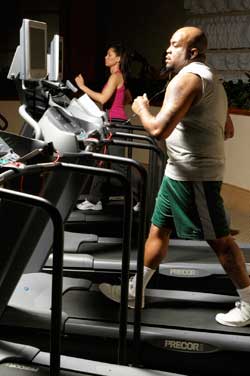
‘Tis the season to try to shed those extra pounds, but a new study suggests the oft-repeated cycle of feast-before-famine may be doing more harm than good, and ultimately make weight gain more likely.
Dr. Tracy Bale of the University of Pennsylvania and a team of researchers put mice on a high-fat diet to fatten them up and then divided them into two groups. The first group was put on a diet, cutting about 25 percent of calories to produce a 10 percent to 15 percent weight loss. The second group resumed its regular diet. After three weeks, researchers measured the amount of stress hormones present in the blood and found higher levels of corticosterone among the dieting mice. These mice also exhibited more symptoms of depression than their non-dieting counterparts, as well as marked changes in gene activity related to eating and stress management. In fact, these changes persisted as long as two months after the mice stopped dieting, which, researchers noted, is equivalent to years or even decades in the life of a human.
After the diet ended, researchers created an environment of mild, chronic stress for the mice (e.g., damp bedding, switching cages) and the mice that had dieted responded by eating more high-fat foods than those that had not dieted. Again, stress hormone levels were much higher among the former dieters.
According to Bale, “These results suggest that dieting not only increases stress, making successful dieting more difficult, but that it may actually ‘reprogram’ how the brain responds to future stress and emotional drives for food.” Bale suggests that dieters should be aware of this stress effect and take appropriate precautions to try and manage their stress levels.
Source: Journal of Neuroscience (2010). Caloric restriction experience reprograms stress and oxrexigenic pathways and promotes binge eating. Dec 2010; 30: 16399 - 16407 ; doi:10.1523/JNEUROSCI.1955-10.2010

The rise in obesity has brought with it numerous consequences, not the least of which is a dramatic increase in the rate of type 2 diabetes. Because it is generally brought on by poor lifestyle habits, type 2 diabetes can potentially be controlled through the adoption of healthy habits, including regular physical activity. But what is the optimal exercise program for combating this disease?
A team of researchers led by Dr. Timothy S. Church, director of preventive medicine research at Pennington Biomedical Research Center at Louisiana University, believe they have found the answer to that question. In a study published in The Journal of the American Medical Association, researchers demonstrated that a combination of cardiovascular exercise and weight training can significantly lower blood sugar levels in people with type 2 diabetes.
Church’s team recruited 262 sedentary men and women with type 2 diabetes to participate in the study. Participants were divided into four groups: resistance training three days per week; cardiovascular exercise; a combination of the two; or a non-exercise comparison group. The cardiovascular group exercised the equivalent of 12 kcals/kg per week and the combination group exercised 10 kcals/kg per week and performed resistance training twice per week.
After nine months, all participants were evaluated. While all the exercise groups reduced their waist circumferences and fat mass, only the combination exercise group experienced a significant reduction in HbA1c level, a marker of blood glucose, from 7.7 percent to 7.3 percent. This change, explains Church, is enough to significantly reduce an individual’s risk of heart disease.
It is important to note that 63 percent of participants were women and almost half were not white, suggesting that these findings have broad application. Additionally, the exercise requirements of the combination group are not extremely high volume (two resistance-training sessions plus 700 calories burned per week for a person weighing 154 pounds) and, therefore, not out of reach for many people.
Source: The Journal of the American Medical Association (2010). Effects of aerobic and resistance training on hemoglobin A1c levels in patients with type 2 diabetes. 304, 20, 2252–2262.